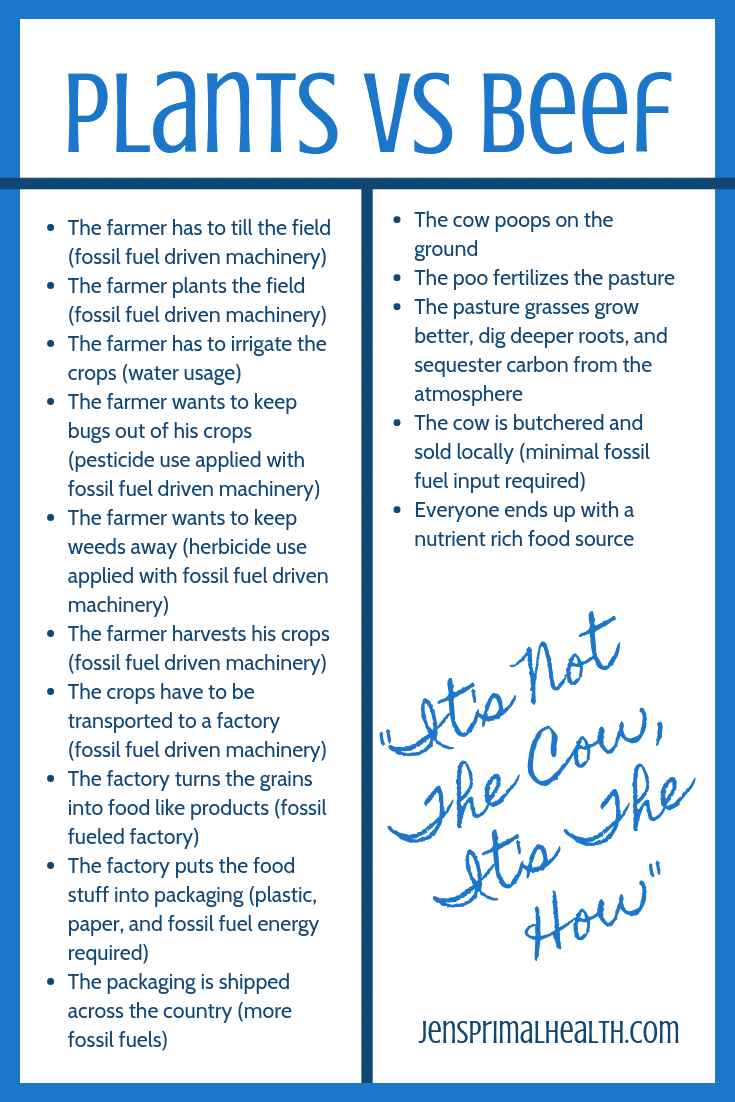I earn a small commission via affilate links at no extra cost to you.
Adopting a plant-based diet is all over plant-based news. There is this false notion that beef and meat are to blame for climate change. If only people would eat less meat then we’d all be healthier and we’d save the planet, right? It’s what they say but is it true? They say that global warming is caused by beef but in reality that couldn’t be further from the truth. What if the latest plant-based diet push is nothing more than low-fat diet dogma wrapped in an environmental facade? Thankfully you have me, my environmental science degree, and a bit of common sense to see through the plant-based nonsense. In fact, if you understand how it all works you’ll see that beef is the most vegan thing you can eat.
For those who are still not sure about climate change, I can assure you that climate change is real. Most people don’t know that the Earth is heated from the ground up. Sunlight enters the atmosphere as short wave radiation. There’s a term called albedo that determines how much sunlight is reflected vs absorbed. Think of the difference between sunlight on snow versus sunlight on the blacktop. A sunny day in the snow will definitely have you reaching for your sunglasses. When noticing the snow where does the snow melt first? Undisturbed by humans you’ll notice that the snow melts first near darker objects like the base of a tree. On a hot summer day would you rather walk barefoot on the grass or the blacktop? Would you rather have tan seats in your car or black? This is albedo in action. Darker colors absorb the short wave radiation and emit the long wave radiation that we feel as heat.
Keeping with our winter theme have you ever noticed the difference in morning temperatures when the night sky was filled with clouds compared to when it was clear? Clouds prevent the heat emitted from the ground from escaping. While clouds are made of water vapor, a greenhouse gas, they also contain other greenhouse gases such as SOx, NOx, CH4, and many others. These gases are all released when we burn fossil fuels and they’re the primary cause of global warming, not beef.
 Beef Reverses Climate Change
Beef Reverses Climate Change
If you’ve ever had a discussion with a plant-based advocate you’ll often hear that cows are the absolute worst thing for the environment. They rattle off water consumption, deforestation, and the fact that you can feed more people with the grain it takes to feed a cow. When I studied Environmental Science in college I heard all of these same things. The thing is, you need to step back and really think about what you are told and question whether or not it makes sense. All of the inputs of water for example are to water the crops to feed the cows. So, if the water for the crops that the cows are fed is the problem how is making everyone eat more crops going to use less water? Ya know? In fact, rice is one of the most water-intensive crops that emit greenhouse gases.
If the water for the crops that the cows are fed are the problem how is making everyone eat more crops going to use less water?Cows also don’t cause deforestation, lazy humans do. The cows don’t need us to cut down trees so that they can graze. I live in the wild west known as Idaho and there is a lot of open range. We don’t cut down plants to make room for cows. The cows simply roam on lands that otherwise wouldn’t grow any food. It’s the high plains desert and during the summer there is little to no rain. Corporations cut down trees so that they can squish more animals onto a patch of land. They feed these cows grains, keep them in cramped living conditions, and the water runoff can have a negative impact on local waterways if it’s not managed properly. This is everything that’s wrong with beef production and climate change. It’s not the cow, it’s the how.
As for feeding grains to cows or people, this isn’t healthy for anyone. If you’re not aware there are more reasons to avoid grains than there are to eat them. When we feed grains to cows we ruin all of the potential nutrient benefits we could be getting if we simply let them graze on grass. Grain-fed beef is high in inflammatory omega 6 fats. Additionally, it’s often packed with the herbicides and pesticides that are used on the crops. Yum!
Conversely we can put a cow on a pasture in our community and this is what happens:
- The cow poops on the ground
- The poo fertilizes the pasture
- The pasture grasses grow better, dig deeper roots, and sequester carbon from the atmosphere
- The cow is butchered and sold locally (minimal fossil fuel input required)
- Everyone ends up with a nutrient-rich food source
Pasture-raised beef is one of the best tools we have to reverse climate change. Manure from cows fertilizes the pasture which fertilizes the soil, increases its water holding capacity, and a strong pasture pulls more carbon dioxide from the atmosphere. Carbon is stored in the soil which is something that commercial agriculture can’t do. Climate change is exacerbated by the repeated tilling of the soil, releasing carbon into the atmosphere.
A Plant-Based Diet
- The farmer has to till the field (fossil fuel driven machinery)
- The farmer plants the field (fossil fuel driven machinery)
- The farmer has to irrigate the crops (water usage and fossil fueled power)
- The farmer wants to keep bugs out of his crops (pesticide use applied with fossil fuel driven machinery)
- The farmer wants to keep weeds away (herbicide use applied with fossil fuel driven machinery)
- The farmer harvests his crops (fossil fuel driven machinery)
- The crops have to be transported to a factory (fossil fuel driven machinery)
- The factory turns the grains into food like products (fossil fueled factory)
- The factory puts the food stuff into packaging (plastic, paper, and fossil fuel energy required)
- The packaging is shipped across the country (more fossil fuels)
Perhaps when you look at the actual numbers you may begin to wonder why we’re saying climate change is caused by meat. In the figure below, notice that using today’s agricultural practices (as imperfect as they are) crops produce more methane than cows do. If “they” can get you focused on the cow then the fossil fuel industry can continue with business as usual even though fossil fuels are the largest contributor of methane in the atmosphere.
Greenhouse Gas Emissions
In agriculture, rice produces half of all methane emissions from crop production, causing nearly 30% of human-generated methane emissions. [1]
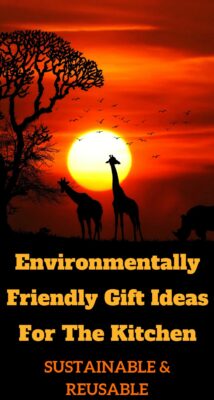
In agriculture, CO2 emissions from plowing fields are the primary contributor to GHG emissions, not “farting cows”. One paper that looked at the impacts agriculture has had on the Great Plains illustrates that the plowing of native grasslands peaking in the 1930 was the most devastating when it comes to carbon emissions. The researchers estimate that if only 25% of producers switch to no-till practices, there would be a 25% improvement in GHG emissions. If 100% switched, the improvement increased to a whopping 80% improvement. [2]
The United States Environmental Protection Agency estimates that the total amount of US greenhouse gases produced from agriculture is around 9%. [3] Of that 9%, only 4% is attributed to animal agriculture, which means plant agriculture produces 5%. Specifically, the beef industry contributes only 2% to greenhouse gas emissions. [4] Transportation, industry, and energy account for 76% of greenhouse gas emissions in the United States. Wouldn’t it be better to focus on reducing emissions from those sources rather than not eating beef to reduce our emissions by only 2%? We can have a greater impact on global warming if we focus on the biggest piece of the pie rather than the mere 5%.
I really don’t know how to make it any clearer. The numbers tell us that fossil fuels are the largest contributor to greenhouse gases. Heck, the numbers even tell us that agriculture has a larger environmental impact than ruminant animals. At this point, the only reason to believe that a plant-based diet is better for the environment is….well, there isn’t one. When you consider all of the nutrition a plant-based diet is missing there really isn’t a good reason for anyone to adopt a plant-based diet for health or environmental reasons.
Plant-Based Agriculture And Soil Health
The very act of farming isn’t natural. Nature doesn’t organize itself into species-exclusive rows. When a large quantity of 1 species is found together it makes it very easy for pests and disease to spread. Conversely as nature designs it, everything is spread out not only to prevent close contact and disease transmission but also so that species can benefit each other.
Consider soil erosion. If a predator or disease wipes out a mono-crop then the soil is left bare for erosion to occur. Conversely, if plant species are spread out with other species in between, the likelihood that all of the plants will disappear at once is greatly reduced. Today we’re planting fields with 1 crop over and over and our soils are taking a beating for it.
“Industrial agriculture is good at feeding populations but it is not sustainable. It’s like an extractive industry, said Louise Baker, external relations head of the UN body. She said the fact that a third of land is now degraded should prompt more urgent action to address the problem.” [5]
Again doesn’t it make you wonder why they’re pushing for a plant-based diet as being environmentally friendly or sustainable? Industrial agriculture ruins more than it helps. We’ve degraded 1/3 of the land on Earth? That’s a lot of soil that will have challenges returning to its pre-harvest state. When the soil is tilled, heavily irrigated, sprayed with agrochemicals, and repeated over and over the land becomes barren. Soil that has been abused in this way will support very little life if any. When there aren’t any plants to grow and break up the soil it becomes hard, it’s what they call desertification.
On a piece of hard and nutrient-poor soil, it’s difficult for new life to establish itself. When there aren’t any plants there won’t be very many grazing animals to leave their droppings behind to fertilize the soil. Without plant life, there won’t be any nitrogen fixation by plants in the soil. The decomposition of plants by changing seasons is another way the barren soil is missing natural nutrient inputs.
What Does Sustainable Agriculture Actually Look Like?
We’re living so out of touch with nature and we’re acutely seeing the effects in food production and our health. One hundred years ago it didn’t matter so much because there weren’t as many people living on Earth. In 1900 there were only 1,600,000,000 people living on Earth. Today there are 7.7 Billion people and counting. It’s officially GO-TIME. We need to begin making changes and the sooner the better.
Some will argue that we simply can’t feed the world without grain mono-crops and that simply isn’t true. We currently throw away more food than it would take to feed the starving population. One of the best ways to feed humans a nutrient-dense diet is to get them off of the insulin-producing grain-based diet. When you feed the body real food you’ll discover that you’re no longer hungry all day long. You’ll easily be able to get by on 2 meals a day rather than 3 with snacks in between. The volume of the food you’ll eat will actually decrease because you’ll incorporate highly satiating, calorically dense fats. Check out my latest blog post about how eating less frequently affects longevity. Even better, we can prevent a lot of chronic disease and reduce our healthcare costs when we adopt a low insulin-producing eating strategy.
[1] Is Meat Bad For the Environment?
[2] Measuring and mitigating agricultural greenhouse gas production in the US Great Plains, 1870–2000
[3] Sources of Greenhouse Gas Emissions – US EPA
[4] Inventory of Greenhouse Gas Emissions & Sinks – US EPA

[5] Third of Earth’s Soil is acutely degraded due to agriculture
Originally posted on October 16, 2019 @ 13:36

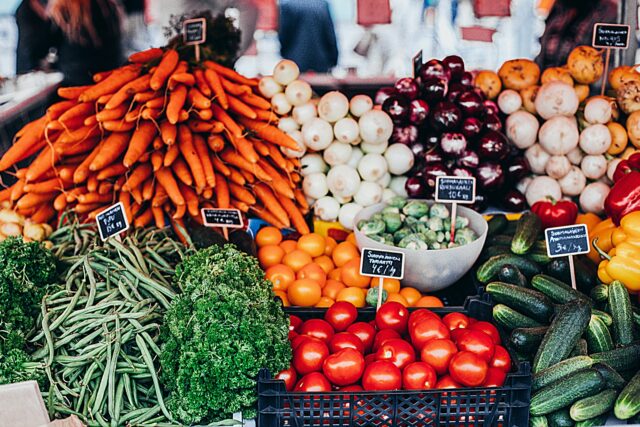
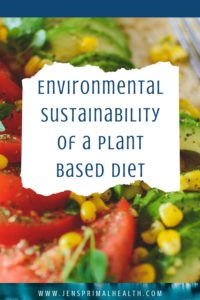
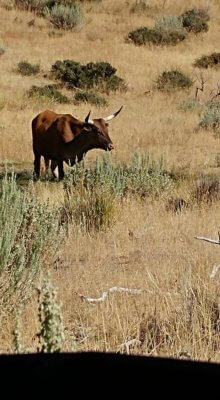 Beef Reverses Climate Change
Beef Reverses Climate Change
